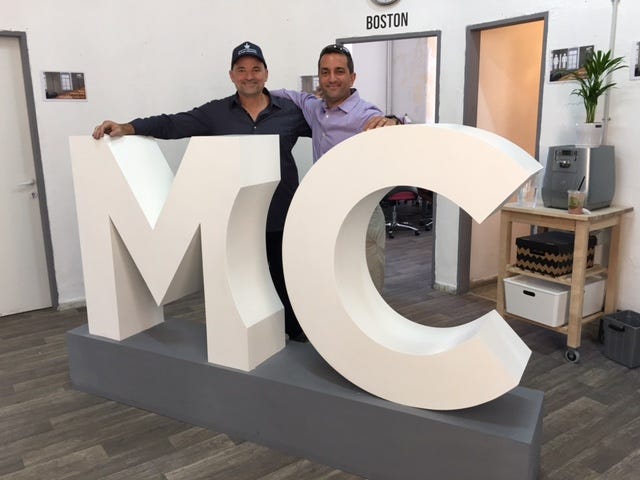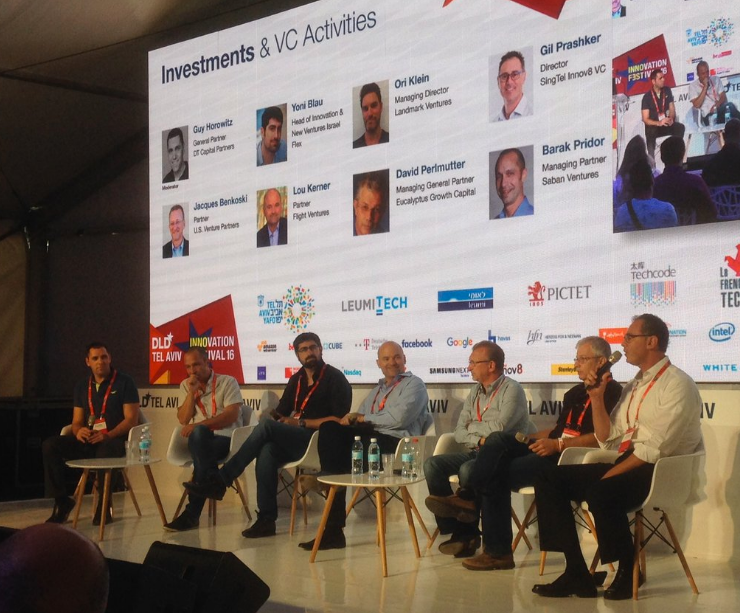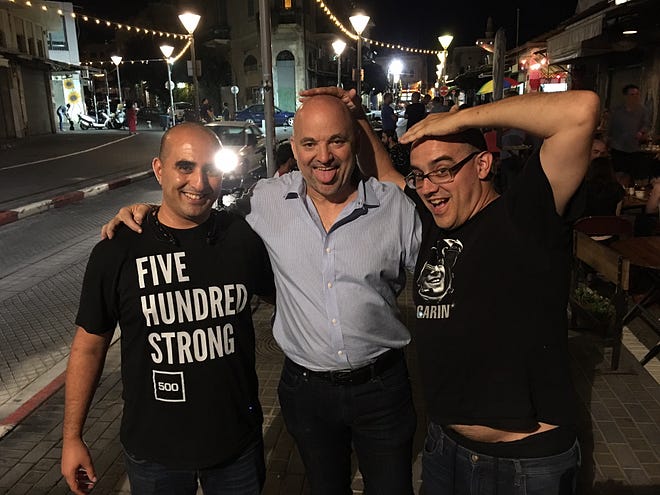
I recently got back from another nine days in Start-Up Nation. My sixth trip in 16 months. My blog post following my first trip in June of 2015, “Why I’m Doubling Down On Israel”, remains as relevant as the day I wrote it. But each trip brings additional context. And the more context I get, the more assurance I have that that my Israel thesis is correct?—?as amazing as the world thinks the Israel tech ecosystem is, the world still has no idea of the innovation and value creation to come.
It was a great nine days to be in Israel. The weather was amazing. And there was lots happening, including the DLD Israel Conference, E&Ys renowned Journey conference, a large China Israel Summit, and a terrific UJA Tech Mission (that I lead).
This post highlights six thoughts about the Israel tech sector that came in to greater focus for me on the trip.
1) The World Is Increasingly Beating A Path To Israel To Learn About Innovation?—?And That’s To The Tech Ecosystem’s Great Benefit
A core thesis of “Start-Up Nation”, first published seven years ago (next month), was that Israel is benefiting from all the large global tech companies that are setting up R&D centers in Israel. Intel is the poster child of that development. Those tech giants are great breeding grounds for Israeli entrepreneurs.
That thesis remains in tact. Israel remains a highly attractive R&D location. Just last week, Business Insider ran the article “Execs from Facebook, Google, and Microsoft explain why they use Israel for their R&D”. The article highlights comments from a DLD panel that included execs from the three companies.
But the global engagement goes far beyond large multi-nationals. Magic Leap, the augmented reality start up that has raised $1.4 billion, opened up an office in Israel last year when it was just a few hundred people. Because some of the smartest people in the world relative to the immense technical problems their trying to solve live in Israel.
I spent some time with 1,000 executives from China who were in Tel Aviv for the first China Israel Innovation & Investment Summit held in Israel (an earlier summit was held in Beijing in January). The Chinese attendees all want to learn from, invest in, and do business with Israel tech companies. The focus of the event included tech related to smart cities, medical devices, ag tech and cleantech, internet and mobile, and advanced manufacturing.
The Governor of Maryland, Larry Hogan, was visiting Israel during my stay, as part of the states annual Trade Mission to Israel arranged by theMaryland/Israel Development Center. Lots of great stuff is going on with Marylanders and Israel.
During my Israel trip I caught up with an Irish friend from New York, Niamh Bushnell, who left the NYC two years ago to become the first Start-Up Commissioner of Dublin. This is her second trip to Israel.
I could go on and on and on and on. The point is, every ecosystem, whether it’s a small company, a large company, a city, a state, a country, or a University, are ALL trying to build better tech ecosystems. And they’re all beating a path to Israel to learn from and work with Israel. And that is as much to the benefit of the entities visiting Israel, as it is for the Israel tech ecosystem.
2) There Are A Rapidly Growing Number of Entities In The U.S. to Support and Accelerate The Growth of Israeli Companies in The U.S.
Since my first visit to Israel, I’ve been a huge fan of SOSA, a unique innovation community in Tel Aviv that includes a significant number of Tel Aviv’s tech community (VCs, incubators, angels, lawyers, accountants, banks…) as members. SOSA encourages visitors from abroad to think of SOSA as a home away from home where they can engage with the Tel Aviv tech community. SOSA just announced that they are coming to New York with Guy Franklin, the founder of Israel Mapped in New York, as the General Manager. SOSA will join SilverTech, as another great community in New York with a focus on supporting Israeli entrepreneurs. ICONYC labs offers a four month program in NYC for Israeli tech startups that want to build their market presence in the US.. CornellTech, the academic joint venture between Cornell and the Technion, is currently operating out of Google’s office in NYC. When it opensit’s campus on Roosevelt Island in New York next fall, the Israeli Tech community in NYC will take another major step forward.
The Valley also has a vibrant and growing Israeli tech ecosystem. NFX Guild, is an innovative accelerator that opened up in San Francisco last year. With legendary Israeli angel Gigi Levy Weiss as partner, NFX Guild gives Israeli companies another home in the Valley. I say another home, as UpWest Labsopened the first Israeli focused accelerator in the Valley in 2012, with much success to show (Honeybook, Apester, Keywee..).
Los Angeles is home to Excellerate, a digital media advisory company with a focus on helping Israeli companies accelerate their growth in the U.S..
Maryland isn’t the only state trying to engage and help Israeli Tech companies. Over 30 states now have some time of cooperative agreements with Israel.
The point is, there’s a rapidly growing global infrastrucutre to help Israeli founded companies succeed.
3) Jerusalem Is Totally Happening
Tel Aviv will always be the Silicon Valley of Israel. But it’s inspiring to see what’s happening in Jerusalem. MobileEye, the $9 billion market cap leader in autonomous car technology, is the biggest home run to date that has come from Jerusalem. And many more great Jerusalem based tech companies are following in its footsteps.
Hebrew University is a hotbed of innovation, including Lightricks, which has built the most advanced visual processing engine for mobile platforms. Lightricks’ photo editing apps, Facetune and Enlighten, are among the best selling and highest rated photo apps in the world.
Hometalk is building the world’s largest DIY community for home projects, in Jerusalem.
I had the opportunity to visit MassChallenge Israel, which opened in Jerusalem earlier this year, bringing their unique not-for-profit acceleration model that has worked so well in Boston and the U.K..

MassChallenge has given the seed stage ecosystem a giant shot in the arm, building on the success of pioneers of the Jerusalem tech ecosystem like Jumpspeed.
With Be’er Sheva emerging as Israel’s cyber security hub, it’s exciting to see innovation increasingly happening in other cities outside of Tel Aviv.
4. Israel Will Be a Major Player in Autonomous Car Technology, Far Beyond Mobileye
Mobileye is the global leader in autonomous car technology, but more game changing autonomous car technology companies are already emerging in Israel.
I was blown away by Oryx Vision, lead by Rani Wellingstein of Intucell fame (Cisco acquired Intucell for $475 million in 2013). Oryx Vision has developed a radically innovative depth-sensing technology that solves the range and resolution vision requirements of autonomous vehicles.
Otonomo is building a new software layer based on open APIs to enable the next generation of software enabled new services, analytics, and security in cars. Otnomo’s platform works with any automobile OEM and service provider, as well as third-party application developers.
I could go on and on, but you get my drift. I already knew Israel was a player in this industry. Via was my last investment. Imaging technology, born out of the Israeli military, has long been a strong suit of the tech ecosystem. Vertex Ventures published a great map of Israeli companies participating in “Automotive 2.0”
But this trip really opened my eyes to the massive impact Israeli companies are going to have in the $4 trillion global auto industry as it evolves from an industry based on manufacturing, to an industry where software will increasingly determine the winners and losers .
5. U.S. VCs Are Still Evolving Their Strategies On How To Optimize The Opportunity In Israel

I had the pleasure of participating on a VC panel at DLD during my visit. There were seven VCs participating in the panel. Three of the participating VCs (including me) had a U.S. VC connection. The other two were Jacques Benkoski from USVP, and Barak Pridor, with Saban Ventures (the venture arm of of Israeli-American billionaire Haim Saban). It was a really interesting panel, highlighting the views of a diverse set of investors relative to the Israel tech ecosystem.
Several other U.S. VCs have great dedicated teams in Israel, including Bessemer Venture Partners, Blumberg Capital, and Innovation Endeavors. But Israel remains a work in progress for many other U.S. VCs who have an interest in the region.
Some the U.S. VCs who had an Israel presence in the late 90’s left Israel when the bubble burst. But even those who stayed, have had their troubles. Benchmark announced they would not raise a third Israel fund in 2010 (partner Michael Eisenberg went on to found Aleph Partners in 2013). Greylock used to have an affiliate in Israel, but they “cut the apron strings” last year and the partners rebranded themselves as the highly esteemed 83 North. While I was just in Israel, I learned that Sequoia, one of the leading U.S. VCs, had shut down their Israeli fund. Sequoia said that the Israeli partners would rather work through the American fund and give their Israeli companies better access to that fund and its resources. Supposedly, there won’t be any changes to Sequoia’s team size in Israel.

While some U.S. VCs are evolving their Israel presence by shutting their dedicated Israeli funds, others are building their presence in Israel. Notably, 500 Startups hired Adam Benayoun as a Venture Partner in Israel last year. Early 500 Startups investments in Israel include Panaoply,io, TestFairy, and Appfront.
Given the huge opportunity in Israel, it’s surprising to me that it’s still a work in progress for many U.S. VCs. But there’s no doubt, that Chinese investors are picking up the slack.
6. Shimon Peres Leaves A Great Legacy of Tech Innovation

I’ve read a lot about Shimon Peres, the legendary statesman, the Nobel Peace Prize Laureate, who passed away during my visit. In fact, I’m currently reading the compelling Ben Gurion?—?A Political Life, written by Shimon Peres (in conversation with David Landau).
I knew about the amazing work Peres did building the Dimona nuclear reactor in the late 50’s, and was happy when I read it was to be renamed in his honor. However, I was surprised, upon his passing, at how much that was written about Shimon Peres, centered around what he did for the Israel tech ecosystem.
“Peres was a unique figure in the history of the startup nation, and that is the reason why he is the most quoted person in our book,” said Saul Singer, who co-authored the book Startup Nation. “His career covered the whole history of the nation, and he played a critical role in helping Israel transition from a socialist, top-down, concentrated economy to a free-market economy focused on innovation.
Professor Peretz Lavie, president of the Technion said that “Peres was a very unique person, a man of optimism and vision, who believed in the power of science and engineering to move humanity toward a better future. He was a strong supporter of nanotechnology research and even laid the cornerstone for the Technion’s Nanoelectronics Center”.
And the final and potentially most important part of the tech legacy that Peres leaves behind is the Israel Innovation Center, to open in 2018, at the Peres Peace House on the Jaffa coast in the south of Tel Aviv. At an event this past July, Peres unveiled his aspiration to use the center to close the gaps between the Arab and Jewish populations, and between rich and poor, and lead to regional innovation collaboration.
“We will prove that innovation has no limits and no barriers. Innovation enables dialogue between nations and between people. It will enable all young people?—?Jews, Muslims and Christians?—?to engage in science and technology equally. Here we will emphasize that we can promote peace from childhood, and we will spark the imagination of every boy and girl and enrich their dreams,”
A great Peres quote that every entrepreneur should remember?—?“When you have two alternatives, the first thing you have to do is to look for the third that you didn’t think about, that doesn’t exist. “
For many of the reasons stated above, and for many not mentioned here, I continue to be hugely optimistic about the future of the Israeli tech ecosystem. It was really another amazing nine days. I learned so much. I met so many great people and so many great companies. I can’t wait for my 7th trip to Israel in January.



The Cherokees had war chiefs and peace chiefs. The article Credits Peres with being the prime mover in converting Israel’s economy from a stagnant top down bureaucratic model to today’s innovation based system. Israel’s government is already balkanized, as opposed to our Presidential system, so that the cabinet is independent of the President, and the Judiciary over-rules the Knesset. Imagine if Israel could have had a war chief and peace chief system, where Peres could have contributed what he had to contribute without having the power to give away the store, sink the ship, mix the metaphor anyway you like, “it’s a free dictatorship.”